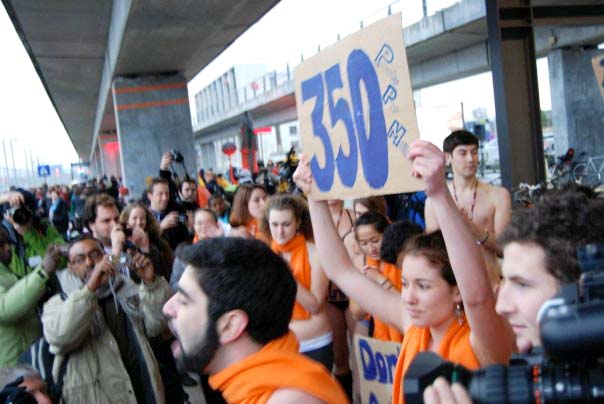On Dec. 6, UCLA students and faculty traveled to Copenhagen, Denmark to take part in the United Nations Climate Change Conference, which was held Dec. 7-18.
Cara Horowitz, executive director of the Emmett Center on Climate Change at the UCLA School of Law, attended the conference along with six law students who were enrolled in an international climate negotiations course.
“The Copenhagen Accord represents for the first time all major emitters coming together, including developing countries, to sign on to emissions targets that will be monitored and verified internationally,” Horowitz said.
One of the goals for the delegation of seven was to add pressure on the U.S. delegation to come up with what could be seen as a fair, ambitious and binding agreement, Horowitz said.
Other goals of the delegation included learning about the process of international lawmaking, meeting some of the most influential policy-makers in the climate world and sharing what the students learned with others through blog posts and updates on a Facebook page created by the students.
Maya Kuttan, a third-year environmental law student, was part of the delegation that attended with Horowitz.
“It was really amazing to be there,” Kuttan said. “The energy and enthusiasm that met me everywhere we went ““ it was really encouraging to see so many committed individuals.”
Kuttan said she learned a lot more being there during the first week because the arrival of heads of state during the second week of the conference resulted in less access for outsiders to move around the conference.
Rebecca Miller, chair of E3: Ecology, Economy, Equity and a fourth-year environmental science and anthropology student, was present for the second week of the conference and experienced a very different atmosphere due to changes made by conference organizers.
“It turned out to be the most unexpected week ever,” Miller said, who was scheduled to observe conference meetings Dec. 14-18 but was only allowed in on Dec. 15 because she had to wait to acquire newly established secondary passes.
Even though mobility in and around the conference decreased during the second week, the message the conference portrayed was clearly visible in the city of Copenhagen.
Miller said everywhere she looked had sustainability-inspired messages with signs such as “Hopenhagen” appearing throughout the city.
The conference ultimately resulted with the creation of the Copenhagen Accord, a deal that asks nations to follow through with a number of objectives to battle global warming in a more unified manner.
However, because the accord is not a legal binding deal, it cannot guarantee that any of the 192 nations present at the conference will follow through with the accord’s objectives.
Objectives outlined in the Copenhagen accord include reducing global emissions to hold the increase in global temperature to less than 2 degrees Celsius, having developed countries mobilize $100 billion a year by 2020 to address needs of developing countries and requiring nations to report to the U.N. every two years about their efforts toward battling global warming.
A prevalent conflict throughout the conference involved many of the poorer nations battling richer nations in an effort to gain funds to fight global warming.
To ease tensions, the accord addresses these issues by stating that “developed countries commit to a goal of mobilizing jointly $100 billion a year by 2020 to address the needs of developing countries.”
The conference’s inability to create a legally binding treaty has not only received the largest amount of criticism, but also created negative sentiments among those who have been following the United Nations Climate Change Conference.
“I feel totally disappointed,” Miller said. “As it culminated on Saturday, I felt frustrated and disappointed because it didn’t end in a binding agreement that our world absolutely needs right now.”
Horowitz was more optimistic, and said that given how far apart countries were in the first week, it seemed like a miracle that any kind of accord was reached.
“There is a real divide, even in the environmental community on the importance of the accord … Some people see it as a real step forward, others think that with all the momentum headed into Copenhagen, it was a real missed opportunity.”
